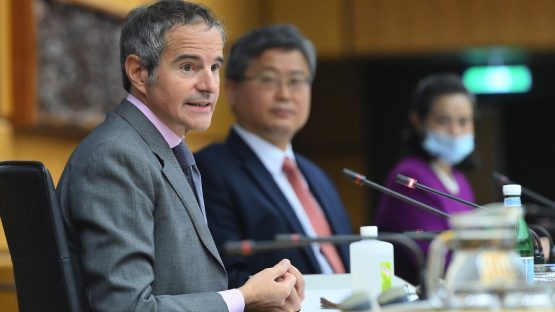Top US commander warned of Iran’s ability to build a nuclear weapon soon.
The United Nations’s nuclear watchdog chief Rafael Grossi said on Wednesday that talks with top Iranian officials in Tehran were “inconclusive” as world powers prepare to return to stalled negotiations in Vienna next week.
According to the International Atomic Energy Agency [IAEA], Grossi met with the head of Iran’s Atomic Energy Organization, Mohammad Eslami, during his visit as well as Tehran’s Foreign Minister Hossein Amir-Abdollahian.
Grossi sought more cooperation from the Iranian side in granting the agency access to its nuclear sites per an agreement reached in February this year.
“However, the repeated prolongation of the agreement, which has now been in place for around nine months, is becoming a significant challenge to the Agency’s ability to restore this continuity of knowledge,” said Grossi.
The UN official also noted that despite this, the agency will continue to cooperate with Iranian authorities.
The IAEA has been raising particular concerns over the lack of access to cameras at the facility in Karaj, which were damaged in June during an attack that Iran blamed on Israel, which has long expressed its fervent opposition to the restoration of the Joint Comprehensive Plan of Action [JCPOA].
US officials warned Israel that attacking Iran’s nuclear sites is ‘counterproductive’
In a September deal between the Islamic Republic and the nuclear agency, Iran agreed to grant inspectors access to service monitoring equipment by replacing memory cards for relevant data needed.
Iran allowed the IAEA to access most of its cameras and replace their batteries as well as memory cards, except the ones at the damaged site.
In turn, Tehran has defended its decision to not grant the nuclear watchdog access to the Tesa Karaj facility saying an investigation over the sabotage remains ongoing.
Grossi noted that the lack of access is “seriously affecting the IAEA’s ability to restore continuity of knowledge at the workshop, which has been widely recognized as essential in relation to a return to the JCPOA”.
The US also expressed its “disappointment” in the outcome of Grossi’s visit, noting it was ready to return to negotiations aimed at reviving the nuclear deal in Vienna
Contrary to the pessimistic comments made regarding the visit, foreign minister Amir-Abdollahian said on Wednesday that he believed the talks with Grossi were “cordial, frank and fruitful”.
In cordial, frank & fruitful talks, @rafaelmgrossi & I reached good agreements on continuing cooperation. Yet, to work out a text, we need work on a few words.
Agreement is possible.
Politicization of technical matters is unproductive.
To finalize text, a meeting to be held soon.— H.Amirabdollahian امیرعبداللهیان (@Amirabdolahian) November 24, 2021
“[Grossi] and I reached good agreements on continuing cooperation. Yet, to work out a text, we need work on a few words. Agreement is possible,” said Amir-Abdollahian.
Concerns over a nuclear weapon
Iran had enriched uranium at 60% purity in response to a series of attacks believed to be conducted by Israel, raising concerns over the nation’s nuclear activity.
However, Tehran defended its decision by saying its nuclear programme is peaceful and the enriched uranium was used to produce molybdenum to manufacture radio-pharmaceuticals.
Nevertheless, world powers including the US warned of the development of nuclear weapons by Iran.
Speaking to Time magazine on Wednesday, General Kenneth McKenzie, head of US Central Command, claimed that Tehran is now “very close” to develop a nuclear warhead.
“I think they like the idea of being able to breakout,” said McKenzie.
Despite Washington unilaterally pulling out of the 2015 Iran deal, the US has been threatening Iran with “other options” if it does not engage seriously with nuclear negotiators. McKenzie also told Time that US President Joe Biden is working to prevent Iran from having a nuclear weapon.
“The diplomats are in the lead on this, but Central Command always has a variety of plans that we could execute, if directed,” said the US general.
The latest developments come as members of the p4+1—China, France, Russia, the UK, plus Germany—prepare to return to the negotiating table in Vienna at the end of this month in efforts to restore the JCPOA.
Indirect US-Iran talks kicked off in the Austrian capital in April this year to revive the 2015 nuclear accord but adjourned following the sixth round in June. The talks were put on hold as Iran’s elections took place, which saw the victory of Ebrahim Raisi.
When former US President Donald Trump withdrew from the JCPOA in 2018, he imposed stifling economic sanctions on Iran in a bid to apply what his administration described as “maximum pressure” on Tehran.
Iran’s foreign ministry stressed that its negotiating team will attend the indirect talks “with serious determination” to remove US sanctions.
Follow Doha News on Twitter, Instagram, Facebook and Youtube







